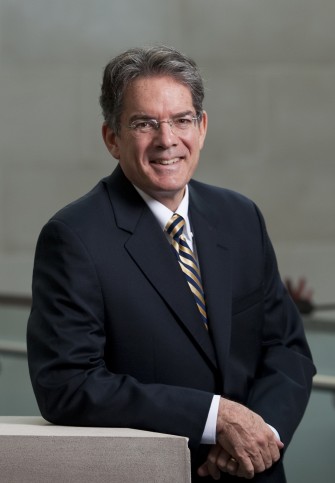Remembering Douglas Lowry
About Douglas Lowry
Douglas Lowry, the Joan and Martin Messinger Dean Emeritus of the Eastman School of Music at the University of Rochester, was a composer, conductor, and academic leader, keenly attuned to the shifting music world and its challenges for music schools and students.
Born in Spokane, Washington in 1951, Dean Lowry earned his bachelor of music degree in theory and composition in 1974 from the University of Arizona, and two master of music degrees from the University of Southern California in trombone performance (1976) and orchestral conducting (1978).
Before coming to the Eastman School in 2007, Dean Lowry was dean and the Thomas James Kelly Professor of Music at the University of Cincinnati College-Conservatory of Music. During his seven-year tenure there, he started initiatives to engage communities in the arts, including joint master classes and concerts with the Cincinnati Symphony Orchestra. He strengthened the conservatory’s presence at the Opera Theatre and Music Festival of Lucca, Italy, where he coached and conducted. He also co-hosted WVXU’s Around Cincinnati, a radio program on art and entertainment in the region.
Previously, Dean Lowry was associate dean of the USC Thornton School of Music, where he served in various teaching and academic leadership positions beginning in 1983.
Dean Lowry became the sixth head of the Eastman School in 2007. He was named the first Joan and Martin Messinger Dean in 2011 and was reappointed in May 2013. Dean Lowry was known for building strategic partnerships locally, nationally, and internationally, and for recruiting important faculty artists. He oversaw the launch of several new initiatives, including the expansion of Eastman’s international partnerships in China and Europe, focusing on the use of technology to create a series of virtual partnerships with prestigious institutions worldwide.
He founded the Center for Music Innovation and Engagement, under Eastman’s Institute for Music Leadership, as an incubator for new forms of music presentation. The Paul R. Judy Center for Applied Research, founded this year and focused on researching and creating models for alternative ensembles, reflects Dean Lowry’s incisive appraisal of the rapidly changing landscape of the music world.
Dean Lowry led the largest architectural transformation in the Eastman School’s history. Under his leadership, the school’s historic performance venue was renovated as Kodak Hall at Eastman Theatre, and the new Eastman East Wing, with state-of-the-art performance, rehearsal, and teaching spaces, was built. The renovation and expansion projects were completed in December 2010.
Committed to raising the profile of Eastman with events and special programs around the country, he re-entered the school into the marketplace of New York City, most notably with the appearance of the Eastman Virtuosi at Merkin Concert Hall and the Eastman Chamber Jazz Ensemble at St. Peter’s Church.
Dean Lowry appeared throughout the United States and Asia as a guest conductor and clinician for orchestras and wind ensembles. His Geo, commissioned and premiered by Christopher Seaman and the Rochester Philharmonic Orchestra, opened Kodak Hall at Eastman Theatre in October 2009. February 2013 saw the premieres of Lowry’s Freedom Zephyr, his ode to the Underground Railroad, by the Rochester Philharmonic Orchestra, and of his Wind Religion by the Eastman Wind Ensemble.
He wrote incidental music for productions at the Cincinnati Playhouse and The Repertory Theatre of St. Louis, and for a variety of other media. His works have been performed by the Cincinnati Symphony, the Louisville Orchestra, the Chattanooga Symphony, the Tucson Symphony Orchestra, the Starling Chamber Orchestra, the Eastman School Symphony Orchestra, Flora Thornton School of Music ensembles at the University of Southern California, and others. He also composed for Music from Angel Fire and other distinguished chamber music organizations.
Lowry’s Suburban Measures for trumpet and organ was recorded on the BIS label by Anthony Plog and Hans-Ola Erikkson. His Blue Mazda, a cabaret song cycle for soprano, trumpets, piano, and percussion, was recorded on the Summit label with the Freiburg Trumpet Ensemble and soprano Maria Cecilia Bengtssohn.
Throughout his career, Dean Lowry served on the boards of numerous community and music organizations, including the National Association of Schools of Music (chairing the Commission on Creative Multidisciplinary Convergence of the Council of Arts Accrediting Associations), the American Classical Music Hall of Fame, the Rochester Philharmonic Orchestra, the Cincinnati Symphony Orchestra, Cincinnati Opera, and Cincinnati School for the Creative and Performing Arts.


